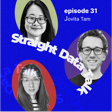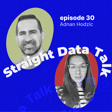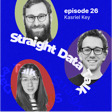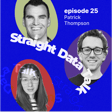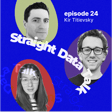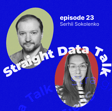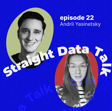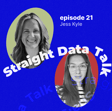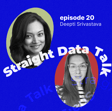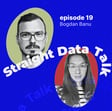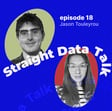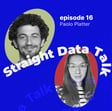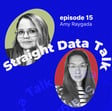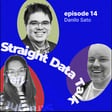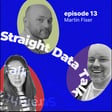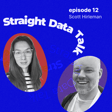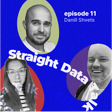Introduction to Ryan Dolly and Super Data Brothers
00:00:00
Speaker
Hi all, it's Yulia from Straight Data Talk together with Damke and we are happy today to host Ryan Dolly from Good Data.
00:00:11
Speaker
He's actually with PR of producted strategy Product Strategy at Good Data. Ryan, please jump in and introduce yourself.
00:00:21
Speaker
Yeah. Hi, everybody. Well, like Yulia said, I'm Ryan Dolly, VP Product Strategy at Good Data. So I've been in BI and analytics now 16 years. and and And then on the side, I also host my own podcast with my brother called Super Data Brothers. So um check that out.
00:00:40
Speaker
Cool. Cool. Thank you so much for joining. Yeah, very nice to have you, Ryan.
Super Mario Brothers Theme and Data Engineering Analogies
00:00:44
Speaker
and Actually, one so one of the first things that I think is interesting, um you you mentioned the Super Data Brothers, and obviously you have the Super Mario Brothers theme, right?
00:00:54
Speaker
Yeah. And so I always think of of the work that I do as a a data engineer, analytics engineer, as as a lot of plumbing, um which obviously the the Super Mario Brothers are are plumbers as well. how Is that your perspective on on data as well?
00:01:10
Speaker
Yeah, I mean, yes, right? Like we we kind of talk about it that way. It is it is a lot like plumbing. um And so, yeah, I mean, it's fun. I mean, the connection to the Mario thing, I think first and foremost, it's just that we're both big nerds and Nintendo fans and but and we're real brothers. We get asked this all the time.
00:01:29
Speaker
Are you guys real brothers? It's like yeah, we're real brothers. um He's the head of business intelligence at Michigan State University. And so we both work in in the in the industry. But the Mario thing is a nice like additional layer of meaning, right? With the plumbing and the analogy to data.
Mergers in the Data Stack Industry
00:01:47
Speaker
Okay. So full disclosure, we are recording it on 13th of October, 2025. And we just broke with the news to Ryan because it's his morning that dbt and 5tran had merged their forces.
00:02:04
Speaker
And also I get to know there is no such thing as merged. There is an acquisition. Ryan did a little bit round of education here. ah So Ryan, we cannot ignore this fact.
00:02:15
Speaker
ah tell Tell what you think about it. Yeah. ah So this was rumored for a while. So on the one hand, it's it's not shocking. ah But anytime you have a big merger, it's always kind of surprising, right? Like these things, they can be rumored and they never come back.
00:02:32
Speaker
they never They never happen. So the fact that it it actually happened and and like you said, you broke the news to me. I hadn't seen it yet. um So, yeah I mean, it's really. Look, I think it makes a lot of sense.
00:02:44
Speaker
People have been predicting for a long time that there's going to be consolidation at the modern data stack and. and we're seeing it happen. And so um I think these two companies, they do make sense together. Like if you look at what they do, they're adjacent to one another in in kind of your data flow diagram.
00:03:01
Speaker
And so it's it's not totally crazy. Like if Fivetran had bought a BI company, it'd be like, hey, you're skipping three steps, you know and so what are you gonna do in the middle?
00:03:12
Speaker
It makes perfect sense from that perspective. Ultimately, I think this is about two things. and I'm curious what what you guys think, but one would be you know a lot of these companies that raised money in kind of the COVID era, raised money at a huge valuation.
00:03:30
Speaker
And now they need to generate a huge cashflow to justify that valuation. So that's thing number one. And then number two, I just think it's, I think that probably the world of cool startups and tech forward companies that are willing to purchase DBT has been tapped.
00:03:49
Speaker
And now DBT needs to get large companies into data engineering, right? Like, and not tech companies, industrial companies, chemical processors, right?
00:03:59
Speaker
That's the only way they're going to make the money to justify their valuation. And so I think it's probably, you know, bundling them, the the two feature sets or the two companies together into a single enterprise sale to a company. Like I'm in Detroit, right?
00:04:13
Speaker
Ford, right? right Like you're going to have a hard time getting Ford to just buy DBT, but maybe DBT plus 5Tran, Ford's more likely to purchase. And and those are the two things that I think are driving Yeah. And and that's so so you've seen that from like a sales perspective as
Challenges of Selling Data Tools to Enterprises
00:04:27
Speaker
well, right? I think where um you're so you're basically saying like for any company to go through this entire like year and a half sales process, they just need to be sizable enough for a company like Ford to even be interested in in starting this process.
00:04:47
Speaker
Exactly. i don't... if If anybody's listening has ever sold into a huge company, you know what it's like. I have. And it's it takes forever. It takes forever. And and so when you're... The DBT was... like The explosive growth phase of DBT, in my opinion, was based on someone being able to start using it for a couple hundred dollars.
00:05:13
Speaker
and And at the enterprise, like you just can't do that. You can't go and acquire some piece of software and install it because your little team wants to start data engineering. It's impossible.
00:05:24
Speaker
And so instead, what you have is a really long procurement process and purchasing process where there's many gates and many people who can say no and many opportunities for the deal to fall apart.
00:05:37
Speaker
And it's not worth it for either party if what we're talking about is a $50,000 deal. And so, you know, just from kind of an enterprise sales perspective, you need to often be offering a lot, a big bucket basket of functionality in order for an enterprise to be willing to, to purchase it, especially at this point when you're,
00:05:58
Speaker
when you're competing against other mega vendors, right? Like Databricks can come in and say, we offer a ton, right? And Snowflake and and everybody like that. And so, you know, if maybe the play here is to create kind of a modern data stack end-to-end data platform, and and we will see other parts of the of the modern data stack be absorbed into the Fivetran plus DBT company, I don't know
Rebundling and Comprehensive Solutions
00:06:24
Speaker
This is very interesting, I showed... I'd say it's just how I see it's not just about the functionality. It's about the value that a single company can create for this enterprise versus hustle, getting them on board. just, yeah, that makes sense. It's just not enough value.
00:06:45
Speaker
Yeah. Even to, to get engaged into a procurement process, if it's just need the data collection, you know, so what then collected the data, but that This is interesting from from like a historical perspective as well, right? Because we've had this unbundling of data tools for for quite a long time. And rightfully so, like you said, in in that COVID era, like the the amount of money that went into all these unbundled tools, there is some kind of race or some kind of expectation that at some point the value will come back. And and so think this is very...
00:07:25
Speaker
much a symbol of that rebundling of of data tools. Yeah. And and it's it's interesting because I would say with the very large companies I work with, they haven't adopted a ton of these unbundled tools. ah if you were So if you were a SaaS firm, say you were, you were ah and don't know, Zoom, I'm just picking one, right?
00:07:47
Speaker
I don't know anything about Zoom. i just That's what came to mind. they you know They were experiencing explosive growth during the same era, so I wouldn't be surprised if they said, hey, we're going to we're going to build our own data stack from the modern data stack. We're going to pick the best point solution for every part of the the the data transformation and visualization process.
00:08:07
Speaker
You know, but like a big company here in the Midwest, I don't know that they've bought any of these tools. Like they live in the Microsoft, Oracle, IBM. and And to them, what's cool, I can tell you, because I talked to a lot of these companies is like they're looking at, say, like a Databricks is a vendor that has the product offering um but like the end-to-end product offering that they say, okay, maybe maybe we should try to get off of Microsoft and get on to Databricks, right? But I've never heard them say, like, let's just take data transformation and get off of Microsoft for data transformation and go to this point vendor for data transformation.
Customer Reactions to 5Tran and dbt Merger
00:08:43
Speaker
Very insightful, very insightful note from you right now, but... I want to challenge it because Databricks still gives you more and this is about more like it's more about um modern... and like like It's going to be bigger change in this case. This is what I'm trying to say. It's about modernizing modernizing the entire cloud system or data storage, whatever they have.
00:09:17
Speaker
I mean, the impact of getting Databricks or let's say Google Cloud Stack is bigger than getting five trends together with DBT. It's a little bit different. You're right. And I think, so in order for what I'm saying to be ultimately proven accurate, I think we would need to see a few more acquisitions into this new combined company, right? We're going to buy a snowflake.
00:09:43
Speaker
ah That would be, I mean, that would be interesting. you know, if it, I mean, like, it's not insane to think that maybe someone would want to acquire Fivetran plus DBT in a way they might not want to acquire one of them on their own.
00:10:00
Speaker
Right? Like that, that's a possibility too. I think you'd have to spend a ton of money on that. So that might make it impossible. But, um but like, that's like, you can see that happening as well, but you're right. So, so, so Yulia, I don't,
00:10:16
Speaker
ah thank you for challenging me. I don't disagree with you, right? That like, look, Fivetran plus DBT is still not a competitor to Databricks, right? And it's still not something that that a Ford would look at.
00:10:27
Speaker
I don't know where keep picking on Ford, but, and you know, yeah it's just because they're down the street from me. It's not something that a Ford would look at and say, okay, we're going to rip out our data stack and just put in Fivetran plus DBT. but But it is a more comprehensive offering that I think they they might be more interested in looking at.
00:10:44
Speaker
Yeah. ah get I got a question about it as well. So we we you know we're talking about money, about this ah bigger companies merging together, but in the end of the day, they have existing customers.
00:10:58
Speaker
Yeah. Fiverr has existing customers and DBT Cloud. Cloud has existing customers. This is a very interesting pivot for them, I think.
00:11:10
Speaker
It's a merging of two databases, basically. customer databases, but also alignment of the cost is coming. And we all know which which vendor cost is more aggressive than the other.
00:11:27
Speaker
So it's kind of tricky. I wonder how the customers are feeling right now. know. Like I haven't interviewed our customers yet, but I will surely get some sentiments. what What do you think about that?
00:11:41
Speaker
Yeah, i so probably they're a little nervous. I would be if I were them. I think that's legit to be nervous. I do think that there a lot of these companies, and i I will preface this by saying, I like i have no special insight into, you know there i don't know I know lots of people at these companies, but you know i don't I don't have any secret insight here, right? I'm just speculating.
00:12:09
Speaker
they need to generate a lot of money now. We have entered the money-making stage of of the company lifecycle. And so if I were a a customer of these companies,
00:12:23
Speaker
I would expect, and there they've already been doing it, but I think now that they're combined, I would expect even more of the, hey, it's time for us to start turning a profit on you.
00:12:34
Speaker
And I've seen this, like this happened in, you go back in time in my career, there was a huge BI stack consolidation from like 2007 to where the 2000s generation of BI tools, the business objects, the Cognos, all of those tools,
00:12:50
Speaker
got acquired by big firms. And um so that happened early in my career and and I know what that is like. And as a customer, it was not great.
00:13:02
Speaker
so ah So look, it because to turn could turn out amazing. I don't want to sound like I'm a total doomsayer here, although I'm just going to say ah kind of been through it before in the BI space and um and it was not great as an individual practitioner working in the field.
00:13:21
Speaker
So just saying about the feedback I'm getting from our customers, it has had. So one vendor is already quite expensive, like get enough expensive and they went in a lot. And another vendor is not yet that expensive.
00:13:36
Speaker
and but But you know, when they mentioned to me, oh, we're paying this amount for this vendor. I'm like, for the past months, I was like, oh, you don't know how much you're going to paying. Yeah.
00:13:48
Speaker
but yeah to me To be fair, so, so um of and full disclosure, like my company, Xebia, the company I work for is is a partner with with both of these companies.
00:14:02
Speaker
ah parties, but um I do see customers using both of these tools like dbt cloud and fivetrend. For those types of customers, I do think it's a it's a benefit.
00:14:15
Speaker
However, that's ah that's a small subset of customers, obviously. So fivetrend was doing this um thing with dbt core at least trying to integrate that in into their product already i don't think anyone was really using that um and so i do think from a customer perspective like if you're fully on this like cloud SaaS thing, then yeah, sure, it's good to have all these tools bundled together.
00:14:44
Speaker
um But like you said, like it's going to get expensive. and so And so speaking of expensive, i I was thinking about this other thing, which I think is a ah very good move if they...
00:14:59
Speaker
for the company, not necessarily for the community. So if you remember, they, a couple weeks ago, 5.0 had acquired SQL mesh, right? And so everyone was saying like, Hey, they're going to use SQL mesh, like to compete with DBT.
00:15:18
Speaker
My, thinking here would be and I wonder what your perspective on this is that they're basically preemptively taking out the competition. Yeah, giving sequel as sequel as the feeling that they are like special maybe because I don't think sequel mesh would have said yes, if they had already merged with dbt, right? Or am I seeing this wrong?
00:15:43
Speaker
I think you're right. I mean, I think that's that's, yeah. I mean, I think you're right. That's probably what doing. Which is sad, right? Because it basically means that they're destroying... Yeah, market. They're destroying market this year.
00:15:57
Speaker
Yeah. and And it's, I mean, that's not a, um I guess it's it's like surprising, but not shocking, right? Like these are the games that get played at this level. But I think that, you know,
00:16:10
Speaker
this If you think about the life cycle of the modern data stack, like i I think that we're just at that phase, right? that We're at the consolidation phase, and it's not going to be very fun for those of us who liked the way the modern data stack yeah was. yeah What will happen coming out of this, in all likelihood, is that there will be this is going to lead to the next generation of vendors in this space being created, right? These frustrations will lead people to found companies that and to, or companies that already exist to start achieving awareness and market share that that they didn't have before.
00:16:48
Speaker
And so it, you know, this is kind of like, this is the, for better or worse, the cycle of capitalism, right? And yeah so we're going to see probably some cool new way of doing data transformation emerge five, six years from now that is going to, we're going to look at DBT and be like, oh, that's the old way, you know?
00:17:06
Speaker
um and And that's just kind of how things go.
00:17:10
Speaker
We are in AI era. Yeah, that's correct. We're soon gonna be talking to our phones like this and say, okay, what kind of transformation are we needing? It's just gonna happen, right? Is this where we're heading? Yeah, right well, maybe.
00:17:23
Speaker
Yeah, yeah I mean, i so for I think it's hard to say. i will say that the first thing when it comes to ai is I don't think anybody yet can say exactly what things are going to look like in five years.
00:17:44
Speaker
And anybody who really thinks they can is either deluding themselves or trying to sell you something. So, um so, so.
AI's Impact on BI and Decision-Making
00:17:54
Speaker
This is so good. is so good. Yeah. I have, I have a confirmation on that. Yeah.
00:18:01
Speaker
Yeah, so I mean, like we can, I'm happy to talk about where I see things going with AI and and my expertise is really in the front end, right? So it's business intelligence, kind of analytics apps, that sort of thing. And I think i think that's gonna change enormously due to AI, but I will even caveat my own opinions by saying like, I don't know any more than any, I mean, like nobody knows, right? So so I could be totally wrong and ah probably will be in a lot of ways. so So this is interesting, right? Because I think um like for the first part of this podcast, we've already talked a lot about tools and tooling, right? But I think um this is also your perspective, right? That a lot of it is about the people and the processes behind this. And so something like...
00:18:50
Speaker
BI, I think, is also very much around like how do you get a company, an organization to make better decisions using these tools or at least getting insights to get the people to make better decisions, right? And and I was wondering, like how would you look at this...
00:19:09
Speaker
Do you feel that this is sort of an unchanging thing in organizations, like having these people and processes in in place? And what does that maybe tell us about how AI is going to impact um this the BI scene, so to say?
00:19:26
Speaker
Yeah. Yeah. So I would start by saying if you look at the BI, where BI is, it's been kind of stuck in a rut for a long time.
00:19:38
Speaker
There are lots of of analysts who produce these papers. I think Gartner maybe made one a couple years ago that was like, BI adoption has been stuck at 27% for a decade.
00:19:48
Speaker
It just hasn't gone up. And ah and it is that is because of kind of the people processes and philosophies that we use in data and in BI.
00:19:59
Speaker
And it's it's not necessarily just because of the tooling. The tooling, i do think, was in need of a change badly. ah kind of the the tableau way of doing things, I would argue has reached its maximum usefulness.
00:20:15
Speaker
And so I was on the lookout for what comes next for a long time before AI started. I think about in 2020, I was like, okay, this is there's got to be a next phase of BI, right?
00:20:26
Speaker
um So we can talk about what that might look like, but ultimately what will determine the success of whatever comes next is our ability to modernize the way we think about data and the front end of data from a people and process perspective. and And if we can do that, then the next wave of tooling will probably, you know we'll get over that 27%.
00:20:49
Speaker
adoption for BI. But if we can't do that, like i I am very skeptical that just giving everybody a data chat bot is suddenly going to get us to, is oh, now we're a data driven organization.
00:21:00
Speaker
Everybody makes decisions based on the numbers, right? I don't think that's going to happen.
00:21:06
Speaker
You can torture data and get yourself the the numbers you need to make any kind of decision. yeah Yeah, people people do. and And that torture process will maybe just be easier when you can do it through a chatbot.
00:21:20
Speaker
Yeah, so this is the case. So so listen, um I was mentally preparing for our discussion today, and this is something I mentioned, that organizations organizations have has have organization have ah difficult times to identify return on investment from BI, right? It's it's kind of, it's ah hard to understand what a return on investment, but it was also hard to get any money without BI, right?
00:21:53
Speaker
and So how is that going with AI right now? Because obviously we see the pressure in in organizations and from executives to people sprinkle AI on everything we are doing.
00:22:11
Speaker
um But it's like never ending discussion. What is the return on investment? And how is it like, how is it looking for you in an bi i all of this mixed
Identifying ROI in BI and AI
00:22:26
Speaker
together? yeah A couple of things I would say.
00:22:29
Speaker
First of all, the a lot of the conversations I see around ah roi for AI and in general, and then also in the data space, unfortunately, seem to revolve around headcount reductions.
00:22:44
Speaker
So there's a lot of that like because it's easy to prove, right? Oh, we we created this agent and we used to have 100 people doing this task and now we only need 20 people. So, so there you go, right? That's, that's ah ROI.
00:22:58
Speaker
I think I'm looking forward to the discussion shifting to what new things we can do because of AI, as opposed to what existing things we can automate. Like, I mean, that is a source of value, right?
00:23:12
Speaker
Certainly. But the explosive value comes from, hey, here's something we couldn't have done or we couldn't even imagine before we had AI. And now we can do it. and And it's probably early for that. Like the the obvious low hanging fruit is these automation tasks. And we see that in data too.
00:23:29
Speaker
So what does that look like in BI? Well, the traditional BI workflow is is essentially the data engineers or ETL developers or whatever they are calling themselves produce the data sets, and then the BI people make the dashboards and visualizations, and maybe they make kind of a layer of metrics on top of the data sets.
00:23:52
Speaker
And they also act as the contact point between the data consumers and the data program, right? So so those are the functions that BI traditionally fills. And i think that there's this idea hey,
00:24:06
Speaker
hey ah We, we like, well, we can just automate that with a chat bot, right? Like that front end, let's just have a chat bot or some AI application that will serve as the front end for our data program that can help build visualizations and, and build dashboards and then distribute those dashboards.
00:24:25
Speaker
and And that's true to an extent. We do see that, right? You can have a chat bot and it can make a line chart. And so the ability to make a decent looking line chart as a human being is gonna become less and less important.
00:24:40
Speaker
But the ability to have the right context to make sure that that line chart is accurate, and is not misleading and did not make up a metric. like Like we, you know, good data, we have lots of AI features in the tool and many more in the labs.
00:24:55
Speaker
And it's obvious that if you say to AI, like, give me total revenue and it doesn't have it, it will often just make it up, for example, right? Because it doesn't want to be wrong. Like they these,
00:25:05
Speaker
These LLMs have been trained using a a feedback loop of like giving giving, not necessarily the right answer, but the answer that the end user found emotionally satisfying.
00:25:18
Speaker
And it's emotionally satisfying to get your total revenue line chart, even if total revenue is not a metric that exists in the data set, right? And so they will just make them up. ah And so so I think the way things are headed yeah in BI is that your raw skill to manipulate a BI tool in order to make a dashboard is going to become less and less important over time.
00:25:44
Speaker
But your ability to work with the end users, work with the rest of the data team, and work with your suite of AI tools to make sure that whatever dashboard is generated is not wildly inaccurate is going to become more important.
00:25:59
Speaker
um and And so that's, we kind of see that in our customer base, but but the challenge remains, Yulia, I think in your initial question was about, well, the value, like how do we measure the value of all this stuff?
00:26:13
Speaker
And one of the challenges with BI that I think we need to fix or find a way to quantify as is like when BI works, it's one of those things that people often, they don't perceive it.
00:26:25
Speaker
right because they got the stuff they needed at the time they needed it to make the right decision. right So so it's it's invisible when it's working well, and when it's not working, that's when you really notice that it's not working. right And so how do we capture that? Like, hey, this lack of friction that you experienced with your data was actually the value of BI when you didn't even perceive it as such.
00:26:50
Speaker
That's a challenge. And I don't i don't know how, I don't know off the top of my head how AI might help us with that.
00:26:59
Speaker
Is it intended to? Yeah, probably not. ha i'm I'm often shocked. So one of the things I've spent my whole career saying to BI i teams is is, you need to have BI on your BI.
00:27:15
Speaker
And they they they often don't. They have no idea. And and if they do, the BI they have is like, look, Last quarter, 900 people logged into Tableau Enterprise Server.
00:27:26
Speaker
And so like, oh, that's the value, right? That's not the value. That's like your licensing cost. ah But that's not the value, right? The value is in these decisions you enabled that wouldn't have been enabled otherwise. And and your ability to tie BI to that.
00:27:42
Speaker
when it comes to making money, saving money, or mitigating risk. Like those are kind of the three buckets of value that we see in BI. And so you have to be able to find some way to tie your BI program to those three buckets in order to show value.
Product Thinking in Data Teams
00:27:57
Speaker
Oh, right. But this is all around data. like Like, first of all, let's take a step back and just admit that ah data professionals are being ah underrated because they just don't market what they're doing. and It's hard to market because they serve horizontally to every other department within the organization. So there is no actual clear metric to measure their impact on it on a business.
00:28:24
Speaker
And it's not just about BI, about BI. It's the same what we see at MassHead about the entire data warehouse. You know, they don't know anything. They don't know a thing about how their data warehouse is performing.
00:28:36
Speaker
um It's not not to blame, whatever. is just mentally impossible to comprehend the scale and challenges they're working today and they completely swapped. but But I also think that we, as data professionals, sometimes go to the other side, right? I see this a lot with clients who have pretty big data teams and I will come in and honestly, I think like,
00:28:59
Speaker
you're not doing a good job. not Not necessarily not a good job. Like you're doing just your job. yeah But looking at the output for the organization, how can you justify that you spend like two years setting up your data warehouse with zero output? Whereas like the analyst next to you who's still working in Excel is churning out like all these dashboards and spreadsheets and and stuff that other people can use. It might not be.
00:29:29
Speaker
totally accurate it might have fallacies, but at least, you know, they're, they're steering the organization in a certain direction. And so this is, this is what I, I mean, I, I tried to live with this sort of concept of how do i justify investing so much money and in migrating a data platform when it's not always clear cut, like if it's going in the right direction.
00:29:55
Speaker
But don't kid, this is the problem in this organization that these two people cannot create a bridge because yeah as for me, those people supposed to be best friends. And, and, and this is not shocking. Listen folks, in my, in my first organization, in my first AT company, not mine, where I was working as a product manager.
00:30:15
Speaker
So I came in and the first team that I approached was success management, but like account management team. They were shocked. They were like, why are you talking to us? And I was like, and no, no, We supposed to be best friends.
00:30:29
Speaker
You tell me the use cases, it doesn't work. And I implement them. And we was happy for folks. It's a win-win situation. And they go, oh, it actually makes sense. But just sex like your ex, like the colleague that was taking your place previously, never talked to us.
00:30:46
Speaker
This is the same, like this is um the, the, and you know, You do the job, you have to align it with someone, you have to have friends at your workplace to make everyone's life easier. You have to find it. And so I guess the question then is like, how do you get or where in the organization should a ah person or a team be that puts these people together to talk to each other and start creating that value or these insights that you need?
00:31:15
Speaker
Yeah. ah So I would say you're right, Yulia. And one of the things that, look, we're three people who work in data who also are the type of people who like to appear on a podcast. 99.5% of the people who work in data appearing on a podcast is a nightmare.
00:31:37
Speaker
So i think I honestly think that there is like a, there is like a, what type of person gets into this field, right? and um And certainly historically, it was really dominated by people who the idea of marketing their own work internally was like a nightmare to them, right? Now that has changed a lot in the last five, seven years as we get kind of, you know, as as data roles have diversified and as the types of people who work in data have become much more diverse, right? When I started, the entire industry looked exactly like me.
00:32:14
Speaker
and And that's not true anymore. And that's a good thing. um So we do have different types of people in it, but, but you know, like what you did, Yulia, when you came in and you said, you know, I'm just going to go out and just talk to people. I'm just going to go talk to these people and see what their problems are. Cause I want to solve them.
00:32:30
Speaker
Like a lot of people who work in data that is extremely uncomfortable for them to do, right. They just are not that type of personality. And so I think that, um, There are some things that can help with that. And actually, one of the things that I think will help with that is if we continue to see the proliferation of product thinking in the data space.
00:32:51
Speaker
Because if if you're at an at a at a and the data team that and kind of embraces the product thinking and data product approach, suddenly this ship fast, heavy user feedback, like very involved with them and their problems is the basis for what you do.
00:33:10
Speaker
As opposed to, Dumpke, what you were talking about with the, hey, two-year data warehouse project before we actually ship anything, which is how all data was done when I started my career. Like my very first data project was a four-year, $17 million dollars data warehouse implementation where we didn't even, mean, we spent all that money and then we didn't have a single report.
00:33:31
Speaker
on top of it at the end of spending that money. We had a data warehouse, there was no way to get data out of it, for example, because nobody had thought of that. So um yeah things have come a long way. ah So I think, like I'm hopeful that that will help, right? That that kind of this embrace of product thinking by data teams might force some operational changes that that where it's like, we need to hire someone on this team who will do what Yulia does and likes to do it ah as part of the new way we operate.
00:34:04
Speaker
But I mean, like we we we we drifted from ai era and BI into the product thing. yeah like i But this is also, listen, right?
00:34:17
Speaker
We want these people to know how to manipulate data. We want these people to be able to build the bridge but from SQL to to business logic and explain it and be able to ah mentally comprehend the business logic from business stakeholders.
00:34:34
Speaker
Then we want them to measure it. Aren't we wanting too much? like i Listen, i'm like I want to pave the way for product thinking for every single person in organization. like I'm a product manager. like yeah You have all my buying.
00:34:52
Speaker
But then when I'm thinking about people who work with daily, our customers, this is way too much. You cannot expect from from these people also to be excellent in dbtu, fivetrend, Google BigQuery, Looker.
00:35:08
Speaker
you know, Python, SQL. And then on top of it, please read all the Marty Kagan books because this is your Bible of product thinking. Yeah, yeah, no, you're right. So I think ah what I see happening is there are companies that I have worked with where they actually hire data product managers.
00:35:28
Speaker
ah And so I can think of, um I don't know if you've ever followed Bergevin on LinkedIn or anything, but follow her. Like she's a data product manager. And so um so at companies that that embrace that and go so far as to actually hire like a product manager on the data team, I see that as working.
00:35:48
Speaker
if you're going to take your dbt developer and then say, Hey, you're also now a product manager, please acting, please start acting like a product manager. That kind of gets back to what I was talking about earlier about like, you know, what type of person, the type of person who is a great dbt developer is not likely to be also the type of person who's going to be an incredible product manager. There are people who can do both. So if you're that person and you're listening, like, like good for you, you're awesome.
00:36:14
Speaker
You're right. But, but like, Having both those skill sets in one person is is hard to find. And then asking one person to do both is probably not setting you up for success.
00:36:27
Speaker
and Appropriately also not good for the company, right? Because what are the chances that you're going to find another person like that yeah when they leave? Yeah. So you need to have that in in in separate roles. Right. now if you ever When you hire unicorns, you' you've now set yourself up to always have to find unicorns. Yeah.
00:36:42
Speaker
Yeah, yeah, exactly. and And so this reminds me a lot of um the changes that we've seen basically in in the software development and and the web development world, right? So 10 years ago, i was a little bit more into into web development than I'm currently.
00:36:59
Speaker
um But I saw this change of like everyone moving to... Agile this and they were implementing Scrum and and all these different kind of ways of thinking around that.
00:37:11
Speaker
But they are still like like yeah you were saying, ah Ryan, the the the big enterprises still haven't tackled this problem. And so I think there's just a giant lag in a lot of these industry-wide changes um where probably in the data um setting, we will see it in the data where we will see a similar kind of change, right? and And so I'm wondering also if this brings us full circle kind of back to the beginning, maybe we need these kind of like bigger bundled tools to allow this change to happen different
00:37:52
Speaker
bigger, like lagging dinosaur companies that otherwise won't be able to think in data products, basically, unless they have a big, giant tool that tells them to treat everything as a data product.
Cultural Change Through New Software Tools
00:38:10
Speaker
i So I think I get asked a lot of times, again, in the context of BI, i but it's Hey, what? Like I ask people, they're like, Hey, we're looking for a bowy yet BI tool, new BI tool. And I say, why?
00:38:25
Speaker
Like, what do you think you're going to get? And at the, at the biggest companies, what I see is that purchasing new software is actually your only opportunity to change the culture.
00:38:38
Speaker
Like that's that's what you're buying. Wow, that's so interesting. but Well, because suddenly there's budget, right? And and there's like, ah hey, we're you know we're moving to a new platform. And as part of a new platform, there's going to be a new way of doing things. And we're all going to get new training in agile or data products.
00:38:56
Speaker
And you know all of our operational, like that day-to-day drag of working at a huge company where it's like, yeah, we'd love to do things differently, but we have too much operational work. We don't have time to rethink the way we do things.
00:39:07
Speaker
All that gets put on pause for the new platform implementation. And so so it's almost like if you need to spend $10 million dollars migrating to a new platform in order to change your company culture, then do it, right?
00:39:24
Speaker
But if if you don't think that... spending that $10 million dollars will result in a new culture, you're going to be in the same mess you were in before, just on a new stack.
00:39:35
Speaker
and And so I see that all the time, right? it's It's ultimately like, hey, buying the new software, the actual benefit we get is the change in culture and ways of working. and And you would like to think you could just do that without having to buy new software, but I find in practice at large companies, it doesn't happen.
00:39:55
Speaker
Yeah, this is so good. I'm gonna try and keep this in my mind because I always thought of it the other way, right? I thought that, you know, companies, if you're gonna, it doesn't help to buy a new tool, you need to change your culture. So get in some like change managers and and do some change manager management things. But actually, you're right, I think like you need to use this like new tool that you're bringing in as a device for changing your culture. i think that's so interesting.
00:40:23
Speaker
Big disruption. Yeah, you're so much right. Because I have a confirmation story about that. So there is a big organization the UK and they are using the data transformation tool back from nineteen eighty s nineteen eighty s And there is 60 people working on this organization just to maintain it.
00:40:46
Speaker
You can, and, and, you know, today was again, in famous data form, you know, what you name it, you don't need this much people to maintain it And this organization is also a modern cloud.
00:41:01
Speaker
Uh, yeah, they, they are on, on, on Google cloud. So it's just ridiculous to be using it And the person that was. pushing the change towards the modern data transformation framework, the people were going after to this person and saying, oh, you want to or you want us to lose a job.
00:41:25
Speaker
So they were so much threatened by the fact that this person would introduce new solution. and And like, Ryan, this is such a... but What I'm thinking right now, I'm i'm putting the hat of a salesperson.
00:41:41
Speaker
When you engage with an organization and you say, okay, do you actually say it out loud that it's not just going to be a change of your BI, fantastic world. It's going to be a change of culture. This sounds threatening.
00:41:57
Speaker
like like do you Do you actually pronounce it to your future customers?
Selling the Vision of Modern Data Operations
00:42:01
Speaker
ah So it depends. How good of a salesperson are you? You can. I'm obviously it yeah you You could definitely sell a a vision of, and you want to tie it back to your software. So you don't ever want to say, oh you could do this without us. Like if you just had the organizational will, but it's probably true.
00:42:29
Speaker
But instead, yeah, you come in and you say, look, our software enables this new way of working. Right. So it's like, yeah, the features are great. You're going to love the features. But, you know, what the features really unlock for you is a modern way of functioning as a data team.
00:42:45
Speaker
And and people will buy that, I think. Donkey, did you see that Ryan's face expression and body language changed a bit? No, no. Hi, Lucas. It's all good. You know, you can, it's a a junior analytics engineer just joined Duncan.
00:43:03
Speaker
um and but But the case is, ah Ryan, I just, I'm ready to buy whatever you sell because when you you were pitching to me this new vision about modernizing whatever I have here, like,
00:43:18
Speaker
like face expression and body language was, you know, pronouncing that really loud to me, love it. Like I'm i'm booking the sales coach session with you. Hey, it's a maybe it should be a side a side hustle of mine. You know, Yuli, we didn't talk about it, but I was actually an acting student at university. And so um so that that's where that comes from.
00:43:40
Speaker
You know what? I actually, so I pointed this out to Yulia on your like LinkedIn profile. I saw this. i was like, this is interesting because i want to I actually want to talk about this. I feel i had a similar thing and in university. I um i joined the theater society and we staged a lot of plays.
00:43:59
Speaker
And the Ability it gives you to talk to other people to understand how certain like body language and behavior and scenes and interpersonal dynamics yeah make a, do you say a, um, uh, a, a,
00:44:21
Speaker
impact on a situation, on the people that you're dealing with, also in in a consulting setting or in an organizational setting. I think that anyone can can benefit from that.
00:44:31
Speaker
I agree. When and people ask me for career advice, a lot of times they come to me and they say, what you know what languages should I use? Or what you know who has the best model for you doing data AI?
00:44:44
Speaker
And I'm happy to answer those questions. But I often say, i think if you really want to set yourself apart, you should take an improv class and start reading fiction.
Enhancing Communication Skills in Data Field
00:44:55
Speaker
Because the thing, especially as machines are going to get better and better at the technical things, the things are going to set you apart as a practitioner is your ability not to necessarily execute those technical tasks, but to understand them and then to understand the people who are consuming the data.
00:45:14
Speaker
and be that bridge, right? and And that is not something you can learn by reading a book on Python or a book on on how to do analytics, right? You need to learn that through, i mean, I learned it through art and and being an arts student.
00:45:31
Speaker
But Ryan, you also too, so you you mentioned to me this two years ago in Barcelona when when we had dinner. Yeah. i yeah i' I don't think it's landed as well as it's,
00:45:44
Speaker
lens to me right now. So you also have to be able to comprehend you're just sharing, right? and it's It's not ah so like you have to have this maturity Yeah, exactly. And I think this is ah i think this is very hard like when you're just starting out in your career, right? You get people saying, you should take improv classes. No, you should read a book on Python. No, you should like do an internship. yeah All these kind of things. And you probably should do all of them um as they will like benefit you at different stages or different points in your career. And that's that's going
Closing and Contact Information
00:46:23
Speaker
to be hard. But I do...
00:46:26
Speaker
100% agree with you that the emperor of class is definitely only if if if you only even do like a couple of them, it's it's going to hugely help you to perceive the world and perceive people differently.
00:46:39
Speaker
um Whereas the, you know, additional book on Python, you know, Sure, it will give you some benefit, but not like the marginal benefit of that is probably not as much as an improv class, especially like you said, to set you apart from other people and from what the AI can do.
00:46:56
Speaker
Exactly. let's um Listen, ah Ryan, thank you so much for joining. We had a very diverse conversation today, I'd say, but it was super insightful. Yeah, thank you so much for ah spending this this time with us. Is there anything you you'd like to share with the audience? Maybe they can find you on LinkedIn, any other resources?
00:47:20
Speaker
Yeah, I'm everywhere. So um ah LinkedIn, feel free to connect with me. um i i have a substack, superdatablog.substack.com. And then the Super Data Brothers is a weekly show.
00:47:32
Speaker
every Thursday at 12 o'clock Eastern time. And of course, check out gooddata.com if you are in the market for more modern BI tools, that's what we offer. Cool, cool.
00:47:43
Speaker
Thank you so much, Ryan, for stopping Yeah, very nice, Ryan. Thanks a lot. Thanks for having me.

